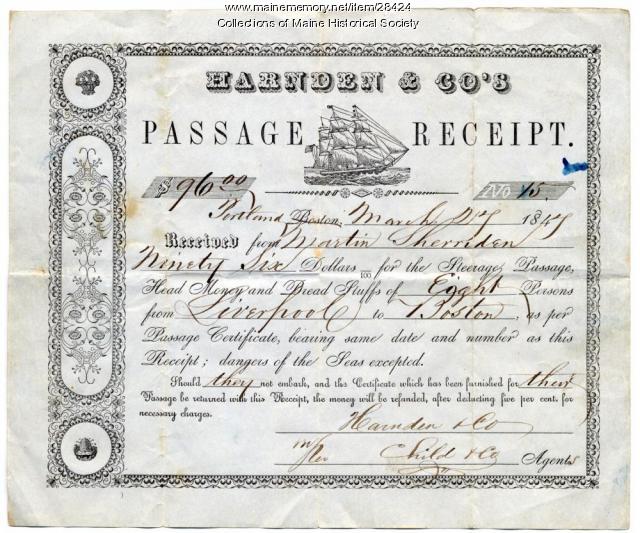Keywords: Passage
Item 22523
William Pepperrell on fares for recruits, 1748
Contributed by: Maine Historical Society Date: 1748 Location: Kittery; Louisbourg Media: Ink on paper
Item 28424
Liverpool to Boston ship passage receipt, 1847
Contributed by: Maine Historical Society Date: 1847 Location: Liverpool; Portland Media: Ink on paper
Item 91815
Assessor's Record, 34 Wharf Street (west side of passage), Portland, 1924
Owner in 1924: Frank D True Use: Storage
Item 87892
Laura M. Gorman Heirs property, West End and North End Passage, Long Island, Portland, 1924
Owner in 1924: Laura M. Gorman Heirs Use: Summer Dwelling
Exhibit
George Popham and a group of fellow Englishmen arrived at the mouth of the Kennebec River, hoping to trade with Native Americans, find gold and other valuable minerals, and discover a Northwest passage. In 18 months, the fledgling colony was gone.
Exhibit
John Hancock's Relation to Maine
The president of the Continental Congress and the Declaration's most notable signatory, John Hancock, has ties to Maine through politics, and commercial businesses, substantial property, vacations, and family.
Site Page
John Martin: Expert Observer - Design for rustic fence, gate, Bangor, 1867
"… his cellar the fifth his grounds the sixth, the passage to a house barn garden field or pasture is one continual pleasure or source of vexation."…"
Site Page
Thomaston: The Town that Went to Sea - Shipbuilding During and after the Civil War - 1861 to 1900
"… damage was guaranteed in the horrendous storms in passages around Cape Horn. The sail loft they built in 1875 still stands in its original location…"
Story
Ah, les Fameuse Ployes!
by Alain Ouellette
Growing up in an Acadian French family and eating ployes
Story
Classroom Time Capsule
by Anna Bennett
On March 12, 2020, I left my classroom not knowing I wouldn't return again for months.
Lesson Plan
Maine's Acadian Community: "Evangeline," Le Grand Dérangement, and Cultural Survival
Grade Level: 9-12
Content Area: English Language Arts, Social Studies
This lesson plan will introduce students to the history of the forced expulsion of thousands of people from Acadia, the Romantic look back at the tragedy in Henry Wadsworth Longfellow's famous epic poem Evangeline and the heroine's adoption as an Acadian cultural figure, and Maine's Acadian community today, along with their relations with Acadian New Brunswick and Nova Scotia residents and others in the Acadian Diaspora. Students will read and discuss primary documents, compare and contrast Le Grand Dérangement to other forced expulsions in Maine history and discuss the significance of cultural survival amidst hardships brought on by treaties, wars, and legislation.
















